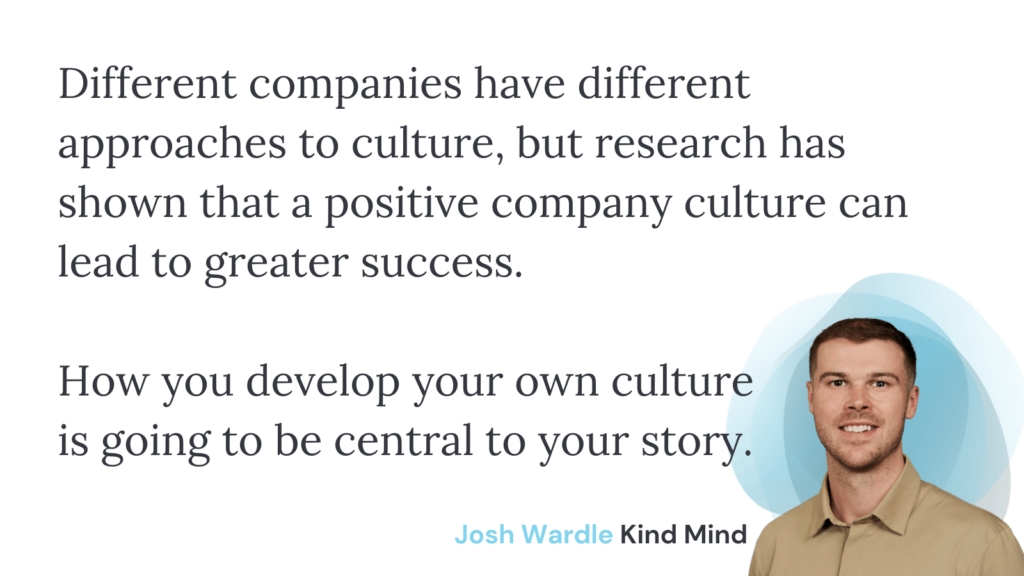Your company culture and employee experience go hand in hand when it comes to a healthy, thriving workplace. But what is the relationship between culture and a positive employee experience, and why does it matter?
We’re exploring that and more in this article.
What is company culture and how does it affect employee experience
Creating and maintaining a positive company culture is essential to fostering a productive and successful work environment. It plays an important role in motivating employees, boosting morale, and ultimately leading to higher job satisfaction.
Think of culture as the personality of a company. It’s what makes your company unique. It isn’t one thing or another, it’s all of it. Your values, traditions, beliefs, interactions, behaviours, and attitudes. Company culture is “the way things are done around here.”
Culture matters because it’s the foundation on which all other HR initiatives are built. If you want to create a positive employee experience, you need to start with a strong company culture.
When company culture focuses on creating a positive employee experience it creates a sense of community. Companies that focus on the employee experience help HR teams improve engagement, empower teams and leaders, and develop workforce solutions that are worthwhile to the employees.
The role of company culture in a positive employee experience
An organisation’s success depends on its employees’ experience. For employees to have a positive experience at work, company culture is essential. When company culture is healthy, it creates an environment conducive to a positive employee experience. It is the foundation for creating a positive employee experience.
In today’s competitive global economy, companies need to understand and improve the employee experience. Deloitte Insight explains, “Understanding and improving the employee experience is critical for companies operating in a highly competitive global economy.”
How an organisation is run, or its culture, affects how its employees feel about their work. This includes their daily interactions, the way they are treated by managers, and even the physical workplace environment.
Where company culture directly intersects with employee experience
Company culture directly affects employee experience in several ways. Employees who feel valued and supported by their organisation are more likely to have a positive employee experience. While those who feel unhappy with the culture are more likely to leave or worse, bring down the culture.
It all starts with recruitment and onboarding and continues through employee development and retention.
Recruitment and onboarding phases
Creating a positive, inclusive culture starts from the very beginning of the employee journey – even before they’re hired. It’s important to communicate your company’s values and culture during the recruitment process so that candidates can get a true sense of what it would be like to work for your organisation.
Global strategy and a focus on diversity are all threads for businesses leading the way in company culture. When company culture is good, employees tend to talk about it. They’re engaged and happy to share testimonials and referrals.
Once candidates are hired, it’s important to reinforce your culture through the onboarding process. This is the time when employees are getting acclimated to their new role and team, so it’s crucial to set them up for success by ensuring they understand your company’s culture and values.
Personnel development phase
Personal development as part of the culture is good for the employee and the company. Workforce development is capital development, says research from Gallup.
Companies who support the personal growth of their employees achieve:
- 7%-23% higher employee engagement
- 14%-29% increased profit
- 10%-19% increased sales
- 6%-72% lower turnover
Retention phase
When it comes to company culture, the retention phase is critical. This is when employees are deciding whether or not they want to stay with the company. A positive employee experience is key to retaining employees.
An organisation’s culture can have a big influence on workplace behaviour, including the decision to stay or leave. Cultures that focus on making money or cutting costs may have higher turnover rates than those that focus on improving processes and making employees happier. Show you care about employee wellbeing. Retention, brand advocacy and burnout are all related to well-being.
Managers are an important part of an organisation’s culture and can also influence whether employees stay or leave. They can use culture in their retention practices. Tapping into the workforce through surveys and insights from data analytics helps management.

The ROI of creating a positive company culture
Measure and analyse the right data to understand how your company culture affects your bottom line. Employee surveys can help you understand and measure your company culture, and the feedback data they provide can help you track performance indicators related to employee engagement. You can see the direct link between company culture and employee experience with revenue, profit, growth, and sales results.
- 94% of executives and 88% of employees believe a distinct workplace culture is important to business success, according to Deloitte
- Insight from Harvard Business Review says, “Employees, especially customer-facing employees, would seem to play a central role in customer experience.”
A company’s culture has a strong influence on its success. Different companies have different approaches to culture, but research has shown that a positive company culture can lead to greater success.
How to create a better company culture
Survey data from Price Waterhouse Cooper suggests that there are culture change enablers significant to companies aiming to adapt. In this economic climate, companies are competitive and looking for an advantage. Understanding your culture to see how it’s driving business or hindering it, is key. Then, identify the traits and behaviours that need to change and begin to proactively manage culture by building new capabilities to utilise what supports your culture.
The top five culture changers PWC refers to are:
- Tone from the top
- Technology and tools
- Incentive compensation and benefits
- Development and training
- Formal communications
Start at recruitment
Right from the start companies have an opportunity to have their company culture shine through. From the very first advertisement or job posting to how your team presents the brand at a job fair, there are a lot of moments for a lasting impression. Showcase your culture from the people who relate most with your applicants. Testimonials from the inside go a long way. Tell employee success stories and share what makes you different. People have well-being and work-life balance on top of their minds.
Company culture that welcomes
Once a new hire has joined the team, they develop as part of the culture from those first important steps. This is the time to share your company values. They can be part of training materials, branding, and the environment where the employee begins.
New hires should be welcomed in and shown how things are done. Stepping into a new company culture may not be easy, but it can be made easier. Think about what your new employee will need to successfully join in and contribute.
Development and training
The culture of your organisation determines how much you invest in employee training, whether you allow for self-directed professional learning or prefer a more structured process. It guides the role management plays in employee development, and how much control employees feel they have over the direction of their careers.
Although development and training will look different across different companies and industries, it’s an important part of the structure of a company culture that focuses on creating a positive employee experience.
Gallup says strength-based development helps workgroups. Organisations with this type of culture succeed because:
- They engage their employees
- They select managers who coach their employees to bring their best selves to work
- They provide an exceptional employee experience
Ready to improve your company culture through better employee experience?
A positive employee experience is essential to the success of any company. It leads to increased productivity, higher morale, and lower turnover rates. The key to a thriving business starts with a thriving workforce.
In a recent article, we explored how HR is changing and how we need to shift from a traditional talent management strategy. At Kind Mind, we believe that by understanding this you can take the first steps to improve company culture, right at its core – your employees.






